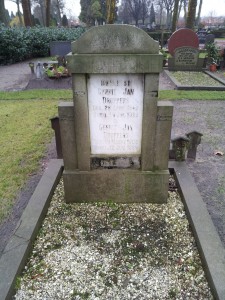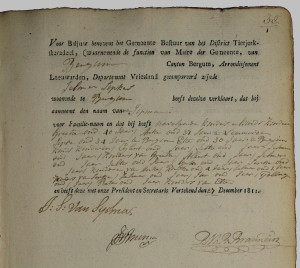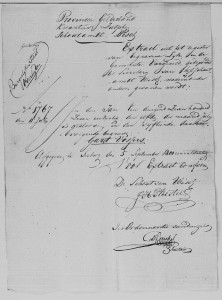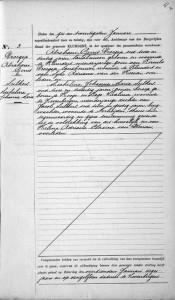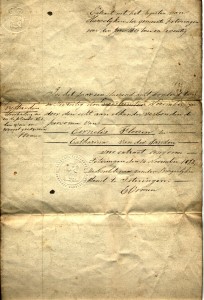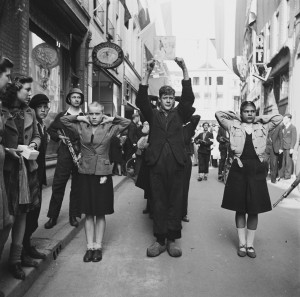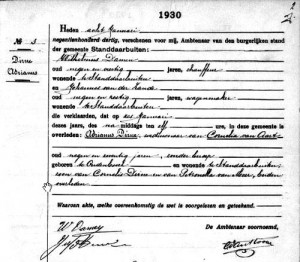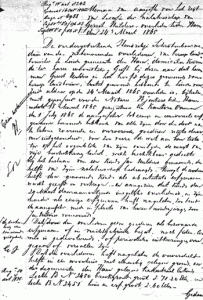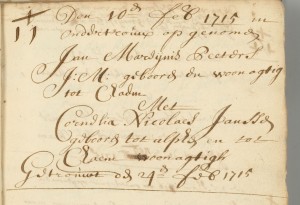Not many cemeteries in the Netherlands can be found on international websites like Find a Grave or Billion Graves. There is no Dutch equivalent for these sites, but there are several websites that provide photos of graves. … [Read more...]
Name taking records
The French occupation from 1795-1813 introduced many new types of administration, including the civil registration. To properly record people, it was necessary that they all had a last name. In 1811 and 1813, Napoleon decreed that everybody had to register their last name. After the French occupation ended, the Dutch government decided to keep the obligated last name. In 1825 they required that everybody who had not registered his name yet should do so. You can find information about … [Read more...]
Marriage supplements: gateway to more information about your ancestors
Since the introduction of the civil registration in 1811, a bride and groom had to submit several documents to prove they were eligible to get married. Not only do these records tell you when your ancestors were born, but they may also provide information about their physical appearance, death dates of parents and previous spouses or even of their grandparents. These documents are known as the 'Huwelijksbijlagen' and most of them still exist and can be found online. … [Read more...]
Marriage record
Marriage records are a part of the civil registration, introduced in 1811 or slightly earlier in Limburg and Zeeuws-Vlaanderen. Marriage records contain the following information: Name, age, profession and place of birth and residence of the bride and groom Names of their parents, and if they are still alive their professions and place of residence If any: names of previous spouses (either divorced or deceased) Name, age, profession and place of residence for 4 witnesses … [Read more...]
Marriage booklets: why they are important even if you can’t find them
In the third quarter of the nineteenth century, municipal authorities began to hand out "trouwboekjes" [marriage booklets] to the bride and groom at the time of their marriage. This booklet would contain the names of the spouses, date and place of their marriage, and had room for the names, birth places and birth dates of any children born to this couple. These booklets can be hard to find, as they are personal documents rather than government documents. The place to find them is in your family, … [Read more...]
Finding collaborators in World War II
With the 70th anniversary of our liberation coming up next week, I thought I would discuss one of the most important record groups for research into World War II. During World War II, several Dutch citizens collaborated with the German occupation: some joined the National Socialist Movement (NSB), others betrayed Jews or were romantically involved with German soldiers. After the War was over, hundreds of thousands of Dutch citizens were prosecuted for collaboration or treason. If convicted, … [Read more...]
Death record
Death records are a part of the civil registration. A death record lists the following data:Place, date and time of death Names of parents Names of spouses Name, profession and age of the one registering the birth Names, profession and age of the witnesses Often: address where the death took place … [Read more...]
Death duties files
To be able to collect tax on estates of deceased people, the family of the deceased was required to file a death duties file within 6 months of the death. These death duties files can be very interesting sources to get an overview of the property of our ancestors. … [Read more...]
Civil registration
For the nineteenth and twentieth century, the civil registration is the primary genealogical resource. All the births, marriages and deaths (BMD) were recorded. Usually, only using the civil registration you can compile a 'backbone' of a pedigree that goes back to the late 1700's. … [Read more...]
Church records
For the seventeenth and eighteenth century, church records provide the most complete records for genealogical research. The church recorded the baptisms, marriages and burials of their members. Many of those records have survived to this day. … [Read more...]
